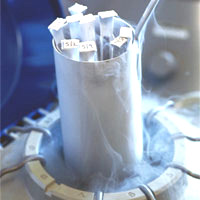Additional techniques
|

|
ICSI is a laboratory technique in which a single spermatozoon is injected into the oocyte's cytoplasm. It is performed in the following cases: severe male factor infertility, poor oocyte quality or low number of oocytes, advanced age, previous failed conventional IVF cycles.



Assisted Hatching (AH)
Assisted Hatching is another laboratory technique, which is performed before embryo transfer.
Under normal circumstances, an embryo emerges or “hatches” from its shell (zona pellucida) before it can implant in the uterus.
In Assisted Hatching, a chemical or laser is used to dissolve a part of the embryo’s outer shell so as to facilitate the hatching process. AH may be performed in the following cases: prior failed IVF cycles, patients > 38 years old, abnormally thick zone.
Testicular Biopsy - Percutaneous Epidydimal Sperm Aspiration (PESA) and Testicular Sperm Extraction (TESE)
Some men have no spermatozoa in their ejaculate but, nevertheless, the testes produce them.
This may occur as a result of a vasectomy, a congenital obstruction of the sperm ducts, inadequate development of the spermatozoa, etc.
In such cases, an Urologist can obtain sperm directly from the testes with a needle or a small incision.
Such techniques are effective when combined with ICSI.
Embryo Cryopreservation

Good quality embryos, not transferred during the course of an IVF cycle, may be cryopreserved for future use.
The embryos are stored in liquid nitrogen at -196°C and may be thawed at a later date.
The procedures involved in preparing for a frozen embryo transfer cycle are much simpler and cheaper than a typical IVF cycle. Cryopreserving strictly good quality embryos maximizes the chances of success when these embryos are thawed and transferred in a future cycle.
Preimplantation Genetic Diagnosis (PGD)
The genetic screening of embryos before they implant is advised for patients at risk of genetic disorders, such as cystic fibrosis or thalassaemia and for couples with infertility associated with chromosomal abnormalities, as is the case with recurrent miscarriages or repeated IVF failures.
Donor Eggs
In many cases, particularly women of advanced age, infertility may be due to diminished ovarian function and consequent poorer quality oocytes. If ovarian function is severely compromised, it is very difficult to achieve a pregnancy with the patient's own oocytes.
The use of donor oocytes is sometimes the only way for a couple to conceive.
It is a complex procedure from a medical, psychological and ethical perspective but, in some cases, also a couple’s only chance to become parents.
For more information regarding our Centre's Egg Donation Program, please click here.
e-webtools
News
After 16 years of trying to have a baby, our dream became reality!
Irini - Babis
Edessa 25/1/2012






